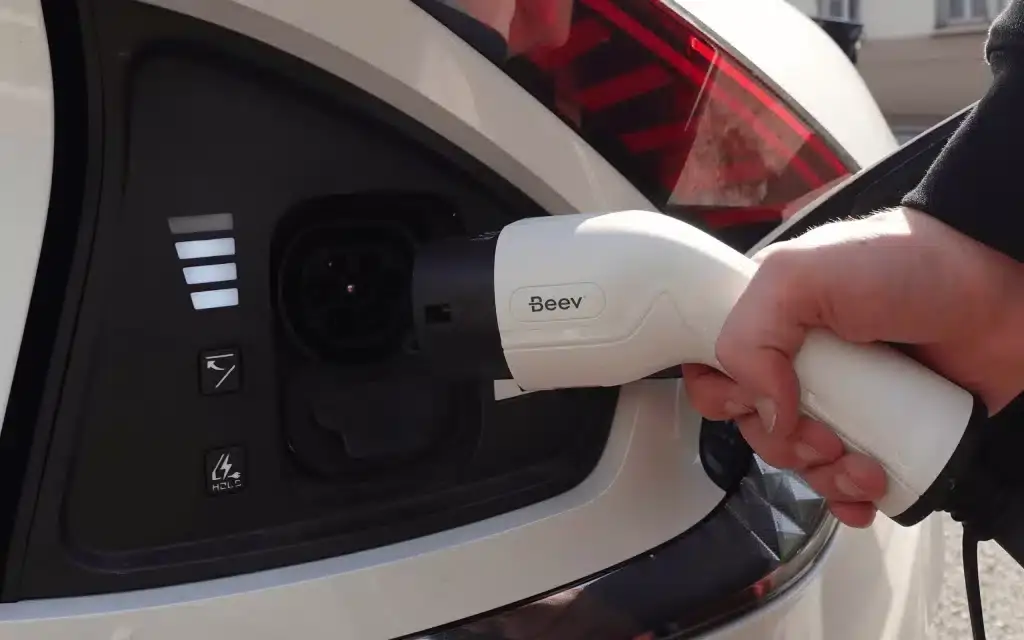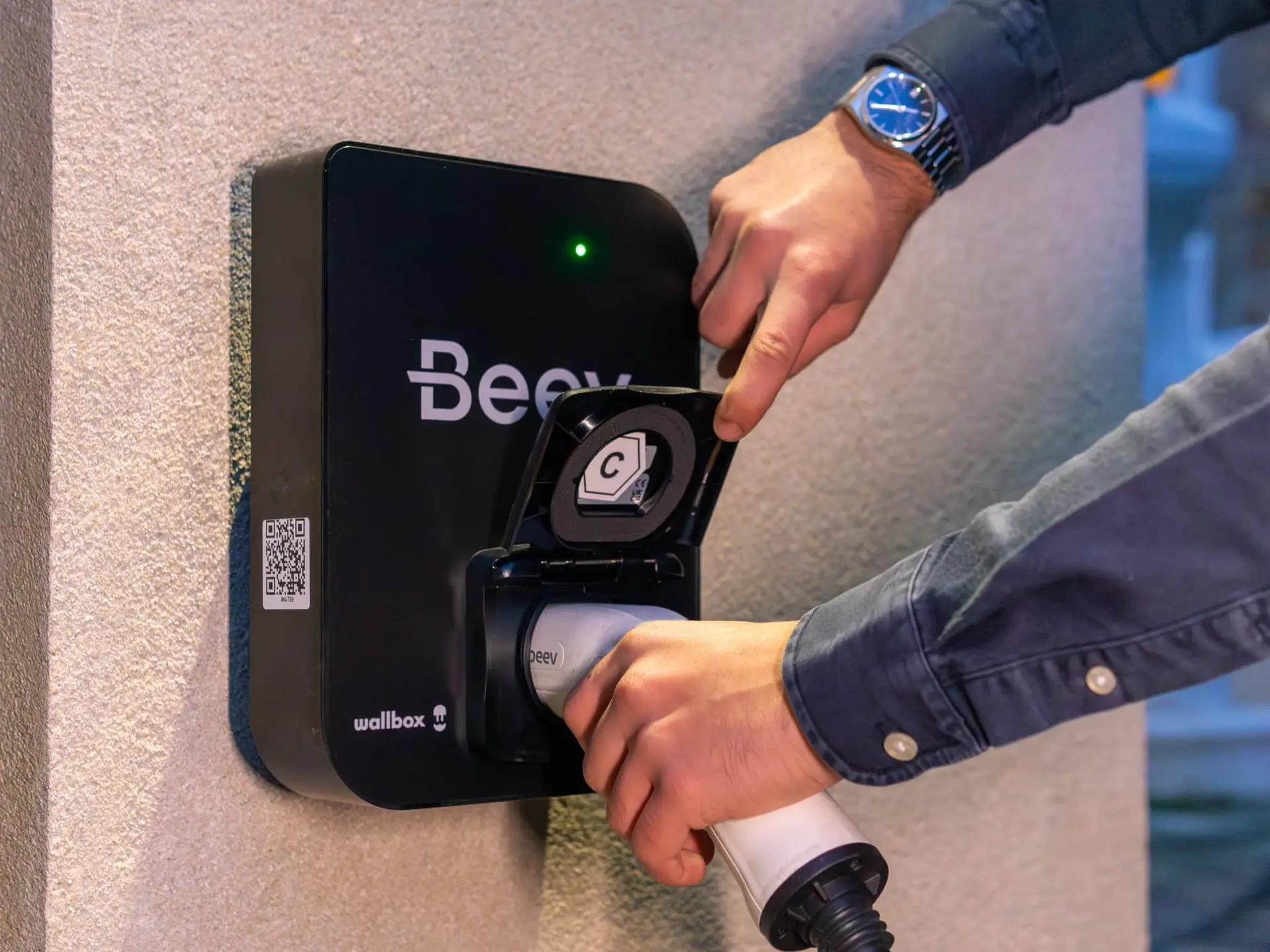Home > Charging stations > Professionals and companies > Installing recharging points at employees' premises
Install recharging points for your employees and facilitate their energy transition
Installing charging stations to your employees is easy with Beev.
Support from A to Z, completely free of charge, from a dedicated expert who will monitor your project.
Wallbox Pulsar Plus Socket

- Charging power : 7.4 kW to 22 kW
- Brand : Wallbox
- Socket type : Type 2
- Three-phase compatible : Yes
- Model : Pulsar Plus Socket
- Number of charge points : 1
- Remote consumption monitoring
- Download consumption reports
Terminal + installation from 1,530 INCL. VAT
Advantages of installing charging points for your employees
Recover your VAT
The company can deduct VAT on the purchase and installation of the charging point, including on the employee's premises. Opting for this solution offers financial advantages and supports the energy transition.
Control your TCO
The cost per kWh at home is lower than at public charging points, reducing the total cost of ownership (TCO) of an electric vehicle.
Manage consumption
Track your employees' energy consumption and optimise their use to reduce the overall costs associated with mobility.
What is it like to be installed with your employees?
We've created a 4-step process to help you complete your electric vehicle charging point installation project:

1. Understanding your needs
A dedicated expert will analyse your employees' recharging needs and advise you on the appropriate charging point, financing arrangements and installation process.

2. Tailor-made offer
The expert will contact your employees to draw up an offer tailored to their situation, in line with your company's regulations and standards.

3. Installation of charging stations
After validation and payment, the employee will receive the terminal at home. A qualified IRVE installer will organise the installation of the terminal.

4. Terminal management and control
Depending on the option you choose, we will train you in our tools for monitoring the consumption of top-ups by your employees.
What benefits and tax charges apply to company charging points for employees?
Deductible VAT : the company can reclaim VAT on the purchase and installation of the terminal.
Amortisation: the cost of the bollard can be amortised over several years.
Subsidies: local or national grants may be available for the installation of charging points.
For the employee :
Exemption from tax and social security contributions : the benefit in kind linked to the provision of a recharging point is exempt from tax and social security contributions up to 50%, capped at €1,800 per year.
Reduced fuel costs: employees can recharge their electric vehicles at home at a lower cost than petrol or diesel.
Important information:
- Employees must use the charging point for their business vehicle.
- The company must keep a register of charging points installed at employees' premises.
Employee charging points: how to choose the right ones?
To find the right charging point, you'll need to identify what your employees really need. Here are a few criteria to help you make your choice.
Journeys
One of the most important criteria is the use made of the electric vehicle by the employee.
If they use their electric vehicle mainly for short everyday journeys, such as :
- Drive the few kilometres that separate it from your premises.
- Everyday travel.
In that case, a simple 7.4 kW charging point will do the trick.
Another criterion to take into account is the maximum current that the electric vehicle can receive!
Not all electric vehicles accept the same charging power. So don't get a charging point that provides a higher charging power than the vehicle's capacity.
The most popular charging points for employees and private customers are those delivering between 7.4 and 11 kW. For 11 kW charging points, the home must provide a three-phase power supply, which is not the norm. Not all vehicles are compatible, but most of the time there is an option for a charging point offering 11 kW, which is suitable for all types of user.
Protection standards
Depending on the space available for the charging point, you'll need one that meets a number of criteria and protection standards.
This is for your staff, especially if they want to install an outdoor charging point. Obviously, when we talk about electronic devices and the outdoors, we inevitably think of the risks associated with rain. As we all know, water and electricity don't mix. That's why it's so important to get a charging point that meets safety standards guaranteeing sufficient protection against heavy rain and impacts. To install an outdoor recharging point, it must at least meet the following standards IK08 and IP54.
Connectivity
Connectivity is an increasingly important part of our daily lives.
Connected charging stations enable their owners to better manage and keep an eye on recharging at all times, thanks to the many functions they offer.
Here's what these terminals can do for you:
- Configure the charging point so that it only allows your vehicle to be charged during off-peak hours, when electricity is cheaper.
- Remote charging point activation/deactivation.
- Block foreign users from recharging, thanks in particular to RFID functionalities.
- Monitor electricity consumption with a detailed consumption calculation.
To find out more, take a look at our article on top 10 best charging points
Charging points with load shedding
Le load shedding is an option available on certain terminals. It regulates the power drawn by the terminal according to the power available on your network.
Among other things, it becomes necessary on certain installations where the subscribed power is insufficient to support the consumption of the terminal. To avoid any problems with your employee's bollard, we strongly recommend that you add this option so that there are no problems with their electrical installation.
Installing with Beev: guaranteed simplicity and benefits
On company websites
Turnkey installation
✓ Audit
✓ Technical feasibility study
✓ ROI
✓ Support
✓ Diagnosis
✓ Maintenance and repairs
Options
✓ Bollard purchase and rental offers
✓ Cladding in your corporate colours
✓ Proposals for additional equipment
At employees' homes
Installation in 10 working days
✓ Remote estimation
✓ Connected and unconnected terminals
✓ Operations throughout mainland France
and Benelux
Options
✓ Bollard purchase and rental offers
✓ Full guarantee in the form of a monthly subscription
Our charging stations are suitable for all types of business
Hotels
Offer your customers recharging points and guarantee a more comfortable stay

Catering
Distinguish your restaurant by offering your customers charging points during their meal

Transport
Optimise your fleet with high-performance charging stations and ensure your logistics efficiency

Public institutions
Take your public institution into the future with public charging stations

Campsite
Modernise your campsite and attract environmentally conscious nomadic customers

Airbnb
Attract more customers by installing charging points in your home

Luxury goods industry
Attract affluent customers who care about the environment.
Offer an exclusive, cutting-edge service

Visit our charging stations
Get your free quote as soon as possible

Our partners










Monday to Friday
9am - 12.30pm - 2pm - 7pm
Join the clean mobility movement






























Make your request now and our experts will contact you within the hour!
Our certifications and standards







Customer testimonials
See also our advice on installing a charging point in your town or region.
A useful resource for professionals wishing to install kiosks
More than 5,000 customers have placed their trust in us
Many thanks to Mr Ulysse DESTOM for his support. He was able to answer all our questions, even late at night. An exceptional follow-up, thank you again!
Meeting deadlines. Clean work.
Dynamic company motivated by customer satisfaction: very quick turnaround, good value for money for the products offered and commitments kept. I highly recommend them.
Hello, Are you looking for a charging point to recharge your vehicle at home? Look no further than beev, great value for money and incredibly efficient service before, during and after! I'd recommend beev with my eyes closed and I really don't regret it. A big thank you to Mr Emmanuel for his professionalism! And well done to the installer who did a great job. Neat work, thank you very much 🙏
New hybrid car, so information about a charging point. After various conversations with competitors, the cost was around €2,000.... Then a call from BEEV, Sofiane explained that, given my hybrid vehicle, a simple reinforced socket would do the job and cost me much less. The only condition is that it has to be fitted by a professional. He could have sold me a plug like the competitors, but he didn't, which shows how serious the BEEV employees are. I did not do business with BEEV, but I would recommend 1000% for their reliability and honesty. I will definitely recommend you to my friends and family. Special mention to Sofiane... Thank you again for your professionalism (it's not commonplace any more... Don't change!!!).
Throughout the process of converting to electric, I benefited from relevant advice in line with my needs, clear explanations and close contact with Amine, which made every stage of the transition much easier. I would recommend Beev's advice and support.
Do you have a question about our services? Perhaps we already answered already answered it!
The installation of the bollard must meet an observed need. It will be necessary to study :
- how the vehicle will be used to adapt the choice of terminal
- the employee's home to avoid opting for a charging point that is incompatible with the electrical installation.
- find out whether your employee's installation supplies single-phase or three-phase electricity
The installation process will therefore involve four stages:
- Choose where to install the bollard (indoors or outdoors), depending on the property.
- Choose the type of charging point to be installed: normal or accelerated charging point (7.4 to 22 kW) depending on requirements and the power supplied by the home (single-phase or three-phase).
- Installation of the terminal by a IRVE-qualified service providerto access ADVENIR assistance if the installation is jointly owned.
- Commissioning the terminal
Certain types of business are eligible for the Advenir programme. For more information, visit :
https://advenir.mobi/je-definis-mon-projet/
If you'd like to contribute to the cost of using the recharging point, you can!
This is known as re-invoicing the employer.
You can take responsibility for all your energy costs.
How does it work?
It's very simple: a recharging operator will collect the history of your recharges, including your energy expenditure and how much this represents on the bill. To do this, you'll need to add a MID-certified meter, which will enable you to be billed for the electricity consumed with the charging point. This meter costs between €80 and €100, to be added to the quote.
They will then send the data to the employer to find out how much to reimburse.
If your employee decides to terminate his or her contract with you, you may well wonder whether it is possible to recover your terminal.
Since this is not a benefit in kind, it is considered to be a company car and belongs to the company.
However, in the event that you wish to recover the terminal, your ex-employee may claim compensation from you.
Compensation following the installation and removal of the charging point, which will leave holes in his home. They may also demand that you restore their home to its original state, i.e. as it was before the installation work was carried out.
To find out more, click here: benefits in kind and company electric vehicle
Installing a charging point on an employee's premises is no more complicated than installing one on a private home. Logically, your employee will only need one terminal, which limits the risks. However, the information required for installation should not be overlooked.
You should not install a charging point with a power rating higher than the power delivered by the home. If this is the case, opt for a charging point with load shedding to avoid blowing the fuse in your home.
This installation should give your employees greater peace of mind when it comes to recharging their vehicles.
The price of a charging point depends on a number of factors, including its use, power, installation work and location.
To give you an idea of the price, the Wallbox Copper SB is the most popular bollard, costing €948 incl. VAT. This is a connected bollard, delivering between 1.4 and 22 kW of power, and is compatible with both single-phase and three-phase networks. It also complies with IK08 and IP55 standards, making it suitable for outdoor installation.
Installing a charging point will cost you an average of between €1,300 and €2,000 for those transmitting 7.4 and 22 kWh. This price does not include the cost of the charging point itself, which is around €1,000.





























